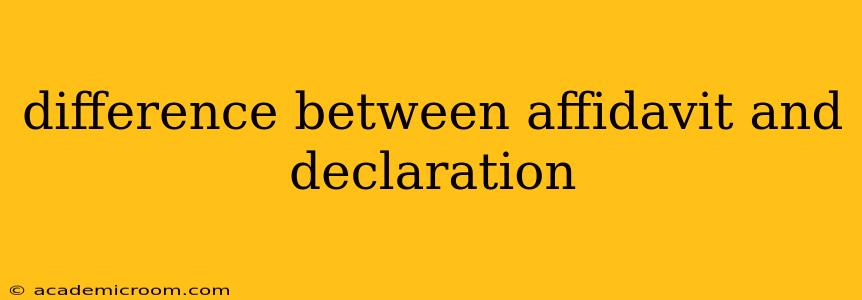Affidavits and declarations are both sworn statements, meaning they're formal written statements made under oath or affirmation. However, there are crucial differences between them, primarily concerning the administration of the oath and the legal consequences of making a false statement. Understanding these differences is crucial for anyone involved in legal proceedings or situations requiring formal sworn statements.
What is an Affidavit?
An affidavit is a sworn written statement made under oath before a person authorized to administer oaths, such as a notary public, commissioner of oaths, or a judge. The person making the statement (the affiant) swears that the information contained within the affidavit is true to the best of their knowledge. This oath adds significant legal weight to the statement. The process usually involves the affiant signing the document in the presence of the authorized official, who then witnesses the signature and affixes their official seal.
Key Characteristics of an Affidavit:
- Formal Oath: Requires a formal oath or affirmation before an authorized official.
- Witness Signature & Seal: The authorized official witnesses the signature and adds their seal, providing official verification.
- Legal Consequences: Making a false statement in an affidavit is considered perjury, a serious crime with significant legal penalties.
- Higher Level of Scrutiny: Due to the formal oath and potential for perjury charges, affidavits generally receive a higher level of scrutiny in legal proceedings.
What is a Declaration?
A declaration, unlike an affidavit, is a written statement made under penalty of perjury. This means the person signing the declaration affirms that the information is true to the best of their knowledge, and they understand that making a false statement carries penalties for perjury. However, a declaration doesn't necessarily require the presence of an authorized official to witness the signing. It often involves the declarant signing the document and dating it, sometimes with a specific statement acknowledging the penalty of perjury.
Key Characteristics of a Declaration:
- Penalty of Perjury: The declarant understands and acknowledges the penalties for making a false statement.
- No Required Witness: Generally, doesn't require an authorized official to witness the signing.
- Simpler Process: The process is usually simpler and less formal than an affidavit.
- Legal Standing: While carrying legal weight, it might not hold the same level of evidentiary weight as an affidavit in all legal contexts.
What are the main differences between an Affidavit and a Declaration?
| Feature | Affidavit | Declaration |
|---|---|---|
| Oath/Affirmation | Formal oath before authorized official | Under penalty of perjury |
| Witness | Required (authorized official) | Not always required |
| Seal | Official seal usually affixed | No official seal required |
| Legal Weight | Generally higher in legal proceedings | May have less evidentiary weight in some cases |
| Consequences of False Statement | Perjury (serious crime) | Perjury (serious crime) |
How are Affidavits and Declarations Used?
Both affidavits and declarations are used in various legal contexts, including:
- Supporting legal documents: Providing evidence or background information in court cases.
- Real estate transactions: Verifying ownership or other details related to property.
- Business filings: Submitting official statements in corporate or business matters.
- Immigration applications: Providing sworn information supporting immigration claims.
Which one should I use?
The choice between an affidavit and a declaration often depends on the specific legal requirements or guidelines of the jurisdiction and the specific context. Always check the rules and instructions of the relevant authority or agency to determine the appropriate type of sworn statement. If you're unsure, seeking legal counsel is always advisable.
Frequently Asked Questions
What is the penalty for lying in an affidavit or declaration?
Lying in either an affidavit or declaration constitutes perjury, a serious crime punishable by fines, imprisonment, or both. The specific penalties vary depending on the jurisdiction and the circumstances of the case.
Can I use a declaration instead of an affidavit in court?
In some jurisdictions, declarations may be accepted in lieu of affidavits in certain legal contexts. However, in other situations, an affidavit might be specifically required. It's crucial to consult the relevant court rules or legal counsel to determine the acceptable form of sworn statement.
Can I prepare my own affidavit or declaration?
While you can prepare the content of an affidavit or declaration yourself, it's advisable to have it reviewed by a legal professional to ensure it meets all the necessary legal requirements and accurately reflects your intentions. Incorrectly prepared documents can have serious consequences.
This comprehensive overview clarifies the distinctions between affidavits and declarations, helping you navigate situations requiring sworn statements with greater confidence. Remember, consulting legal counsel is always recommended when dealing with legal documents and procedures.
